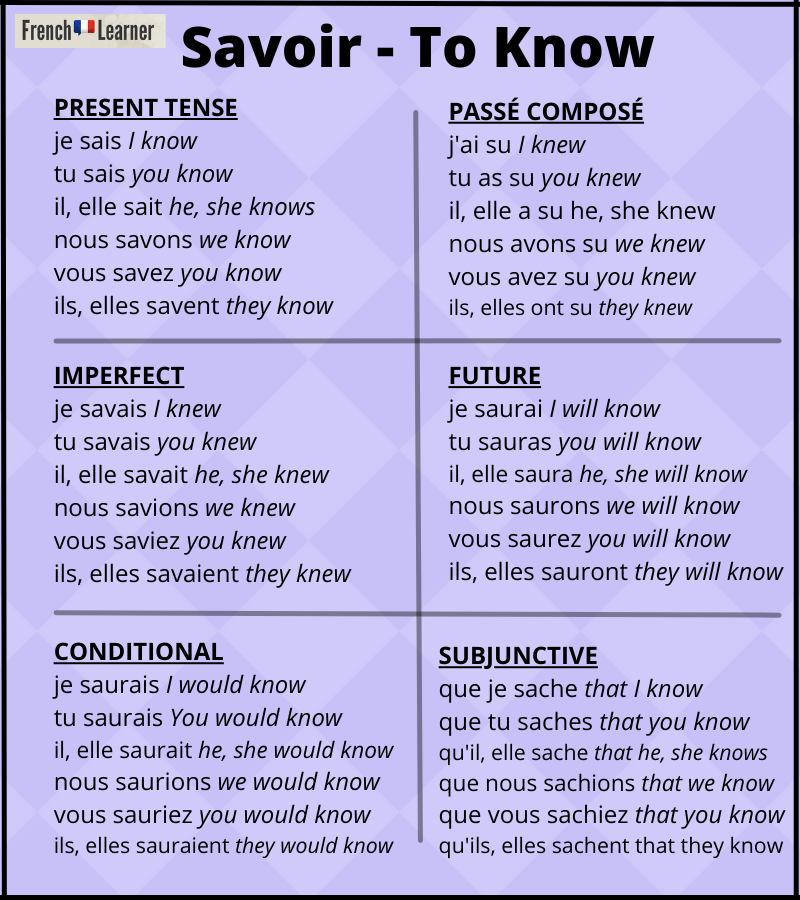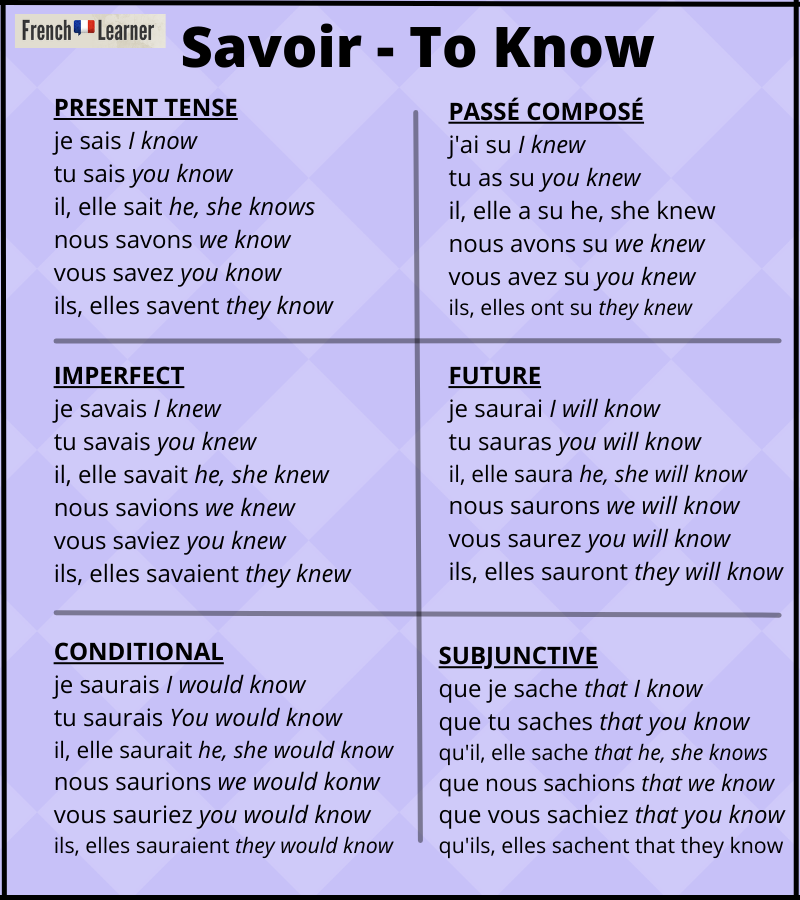The conjugation of savoir (Meaning: To know in French; Pronunciation savwaʀ) is: Je sais (I know), tu sais (you know), il/elle sait (he/she knows), nous savons (we know), vous savez (you know), ils/elles savent (they know). This post provides conjugation charts for savoir in six major verb tenses.

A few quick notes about savoir
Savoir is an irregular ir verb. This means that its endings in the present tense are different to other regular -ir verbs, such as finir (to finish).
In this post we’ve covered the following major tenses:
- present (le présent)
- passé composé (compound past)
- imperfect (l’imparfait)
- future (le futur simple)
- conditional (le conditionnel)
- subjunctive (le subjonctif)
The past participle of savoir is su (knew, found out) and the present participle is savant (knowing).
Savoir means “to know” in the context of knowing facts. For example, je sais que le ciel est bleu (I know the sky is blue).
The French use the verb connaître for knowing people, places and areas of study. For example, Je connais Sylvie (I know Sylvie).
This page on our site provides complete conjugation tables for connaître with explanations and example sentences.
When followed by an infinitive, savoir can also mean “to know how to”. For example, je sais chanter (I know how to sing).
This page on our site explores savoir vs. connaître in detail and provides many example sentences.
Savoir conjugation table
The following table offers a quick snapshot of savoir conjugated in six major French verb tenses. Below you’ll find more detailed charts with example sentences.

Savoir conjugation charts
Present tense (le présent)
In the present tense, je sais means “I know”.
| Je sais | I know | Je sais que tu parles français! | I know you speak French! |
| Tu sais | You know (familiar, singular) | Tu sais où j'habite. | You know where I live. |
| Il/elle sait | He/she knows | Elle sait faire du ski. | She knows how to ski. |
| Nous savons | We know | Nous savons la vérité. | We know the truth. |
| Vous savez | You know (formal, plural) | Vous savez les résultats. | You know the results. |
| Ils/elles savent | They know | Ils savent que nous sommes ici. | They know we are here. |
In the following video, online French teacher Alexa explains how to pronounce savoir when conjugated in the present tense:
Passé composé (compound past)
The passé composé is a commonly used French past tense. In the passe composé, j’ai su can translate to “I knew” and “I found out”.
| J'ai su | I knew | J'ai su le faire. | I knew how to do it. |
| Tu as su | You know (familiar, singular) | Tu as su la difference. | You knew the difference. |
| Il/elle a su | He/she knew | Il a su les résultats. | He found out the results. |
| Nous avons su | We knew | Nous avons su leur réponse. | We knew their answer. |
| Vous avez su | You know (formal, plural) | Vous avez su que c'était vrai. | You knew it was true. |
| Ils/elles ont su | They knew | Ils ont su avant la fin du mois. | They knew before the end of the month. |
Imperfect (l’imparfait)
The French use the imperfect (l’imparfait) tense to describe past events which occurred at unspecified times. Je savais translates to “I knew” as in “I knew all along”.
| Je savais | I knew | Je savais que c'était une bonne idée. | I knew it was a good idea. |
| Tu savais | You know (familiar, singular) | Pourquoi est-ce que tu ne savais pas? | Why didn't you know? |
| Il/elle savait | He/she knew | Elle savait la réponse depuis tres longtemps. | She knew the answer for a very long time. |
| Nous savions | We knew | Nous ne savions pas la difference entre l'accent aigu et l'accent grave. | We didn't know the difference between the acute accent and the grave accent. |
| Vous saviez | You knew (formal, plural) | Comment est-ce que vous saviez? | How did you know? |
| Ils/elles savaient | They knew | Ils savaient pourquoi je suis venu en France. | They knew why I came to France. |

Future (le futur simple)
The French future tense (le futur simple) is used to describe future actions. The verb savoir has an irregular future stem: saur-. Hence, je saurai translates to “I will know” or “I will find out”.
| Je saurai | I will know | Je saurai leur réponse demain. | I will knew their response tomorrow. |
| Tu sauras | You will know (familiar, singular) | Quand est-ce que tu sauras leur réponse? | When will you know their answer? |
| Il/elle saura | He/she will know | Je pense qu'elle saura demain. | I think she'll know tomorrow. |
| Nous saurons | We will know | Nous ne saurons pas jusqu'à la fin de l'année. | We won't know until the end of the year. |
| Vous saurez | You will know (formal, plural) | Quand est-ce que vous saurez? | When will you know? |
| Ils/elles sauront | They will know | Pensez-vous qu'ils sauront le faire? | Do you think they'll know how to do it? |
Conditional (le conditionnel)
In French, the conditional tense (le conditionnel) is used to express hypothetical (would) situations. Hence, je saurais translates literally to “I would know”.
When inverted as a question, sauriez-vous and saurais-tu can translate to “Would you happen to know?”.
| Je saurais | I would know | Je ne saurais pas te le dire. | I would not know how to tell you. |
| Tu saurais | You would know (informal, singular) | Saurais-tu ou se trouvent les clés? | Would you happen to know where are the keys? |
| Il/elle saurait | He/she would know | Saurait-elle la réponse? | Would she happen to know the answer? |
| Nous saurions | We would know | Nous ne saurions pas si c'est vrai ou faux. | We wouldn't know if it's true or false. |
| Vous sauriez | You would know (formal, plural) | Sauriez-vous à quelle heure le train arrive? | Would you happen to know at what time the train is arriving? |
| Ils/elles sauraient | They would know | Sauraient-ils la décision? | Would they happen to know the decision? |
Subjunctive (le subjonctif)
The French languages uses the subjunctive mood to expression thoughts of wish, emotion and doubt. Que je sache translates to “that I know”.
| Que je sache | that I know | Il faut que sache la vérité. | I need to know the truth. |
| Que tu saches | that you know (familiar, singular) | Je doute que tu saches où j'habite. | I doubt you know where I live. |
| Qu'il/elle sache | that he/she knows | Je ne pense pas qu'il sache le faire. | I don't think he knows how to do it. |
| Que nous sachions | that we know | Il faut que nous sachions où louer la voiture. | We need to know where to rent the car. |
| Que vous sachiez | that you know (formal, plural) | Il vaut mieux que vous sachiez quelques verbes! | It would be better that you know some verbs. |
| Qu'ils/elles sachent | that they know | Je doute qu'ils sachent ce qui s'est passé. | I doubt they know what happened. |



